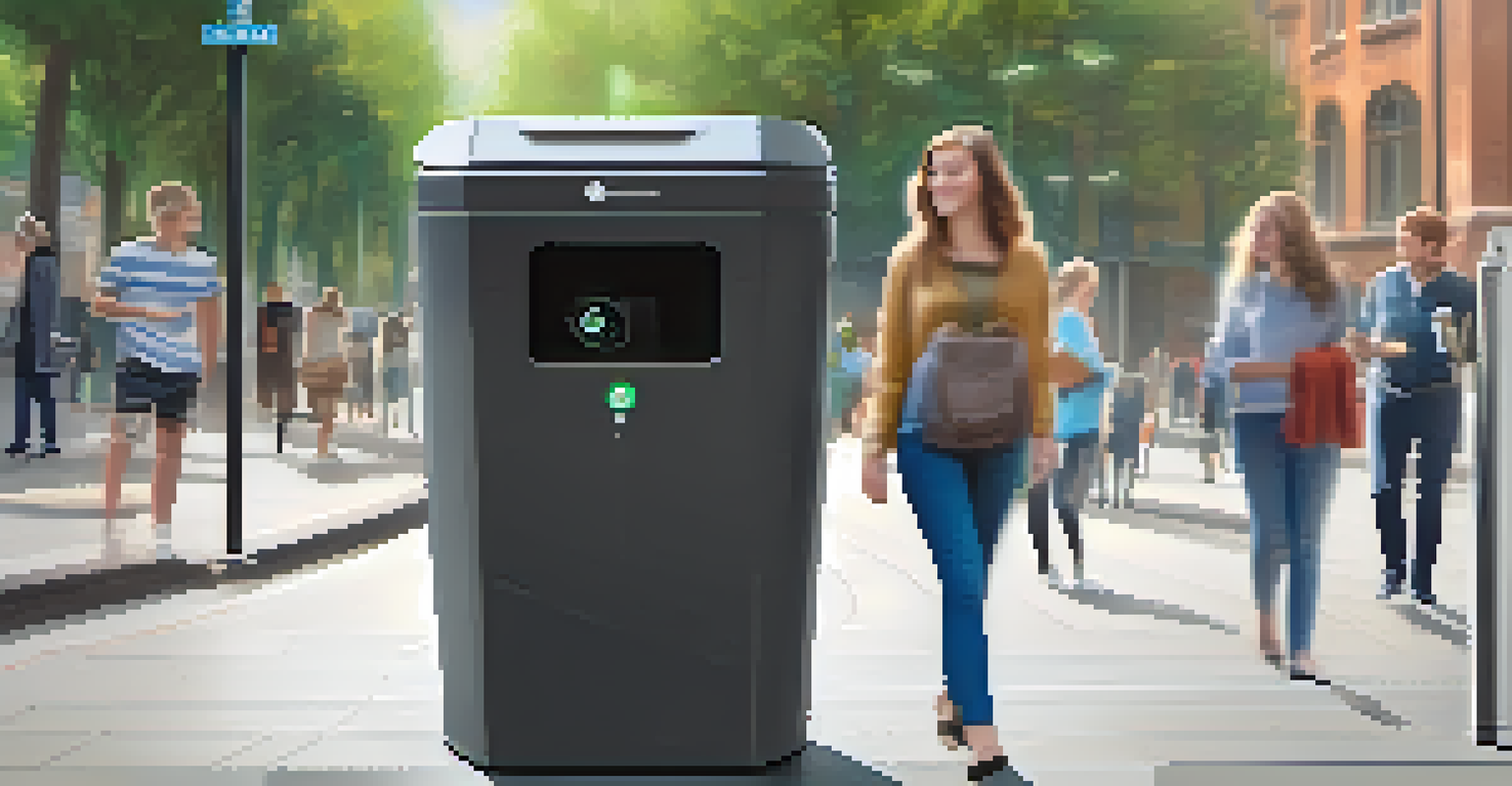Waste Reduction Strategies in Boulder’s Climate Plan

Understanding Boulder’s Climate Plan and Waste Reduction Goals
Boulder’s Climate Plan is a comprehensive approach aimed at reducing greenhouse gas emissions and promoting sustainability. A crucial aspect of this plan is waste reduction, which directly impacts the city’s overall environmental footprint. By minimizing waste, Boulder aims not only to lessen landfill contributions but also to enhance resource efficiency throughout the community.
Waste is a design flaw.
The city recognizes that waste management is not just about disposal, but about rethinking how we handle resources. This includes strategies like recycling, composting, and source reduction, which collectively contribute to a circular economy. This shift not only helps the environment but also fosters a culture of conservation among residents.
Boulder’s goals are ambitious, targeting a significant reduction in waste by 2025. By engaging local businesses, residents, and organizations, the city is committed to creating a collaborative approach to achieving these objectives. The focus on waste reduction aligns with broader climate goals, making it a pivotal element of Boulder’s environmental strategy.
Implementing Composting Programs to Reduce Organic Waste
One of the standout strategies in Boulder’s waste reduction efforts is its composting program. This initiative encourages residents to separate their organic waste—like food scraps and yard debris—from regular trash. By doing so, Boulder can significantly cut down on the amount of waste sent to landfills, where it would otherwise contribute to methane emissions.

The city has made composting accessible, providing residents with bins and educational resources to facilitate participation. This not only helps reduce waste but also enriches the soil, promoting healthier ecosystems. The success of Boulder’s composting program serves as a model for other cities looking to implement similar strategies.
Boulder's Ambitious Waste Goals
Boulder is striving for significant waste reduction by 2025 through community collaboration and innovative strategies.
Community engagement is key to the program's effectiveness. Regular workshops, informative campaigns, and partnerships with local schools ensure that residents understand the importance of composting. With a growing number of participants, Boulder is making strides toward its waste reduction goals while fostering a sense of community responsibility.
Enhancing Recycling Programs for Better Waste Diversion
Boulder’s recycling program is another critical element in its waste reduction strategy. The city has implemented a comprehensive recycling system that makes it easy for residents and businesses to recycle a wide variety of materials. This convenience encourages higher participation rates and contributes to significant waste diversion from landfills.
The greatest threat to our planet is the belief that someone else will save it.
The city continuously evaluates and updates its recycling guidelines to include more materials, thus expanding the scope of what can be recycled. Education plays a vital role here, as residents are informed about correct recycling practices to minimize contamination. This helps ensure that recyclable materials are processed efficiently and effectively.
Moreover, Boulder collaborates with local businesses to enhance recycling efforts in commercial spaces. By providing resources and support, the city fosters a culture of recycling that extends beyond households. This community-wide initiative helps Boulder reach its ambitious recycling goals while promoting environmental responsibility among all citizens.
Promoting Zero Waste Initiatives in Local Businesses
Boulder actively promotes zero waste initiatives within its business community to further its waste reduction goals. By encouraging local businesses to adopt practices that minimize waste, the city fosters a more sustainable economy. This includes strategies like reducing packaging, reusing materials, and composting organic waste generated during operations.
The city offers support and resources for businesses looking to transition to zero waste. This might involve workshops, consulting services, and financial incentives to encourage participation. As more businesses embrace these initiatives, Boulder moves closer to its vision of a circular economy, where waste is minimized and resources are reused.
Composting and Recycling Initiatives
The city enhances its waste management through accessible composting programs and comprehensive recycling systems.
Collaboration between businesses and the city is essential for success. By sharing best practices and success stories, Boulder creates a network of support that inspires others to join the movement. This not only helps reduce waste but also builds a strong sense of community as local businesses rally together for a sustainable future.
Encouraging Community Involvement in Waste Reduction Efforts
Community involvement is a cornerstone of Boulder’s waste reduction strategies. The city encourages residents to take an active role in sustainability initiatives, making it clear that everyone has a part to play. Through events like clean-up days, workshops, and educational programs, Boulder fosters a culture of environmental stewardship.
Local organizations and volunteers often come together to spread awareness about waste reduction practices. These grassroots efforts help engage residents and create a sense of ownership over community initiatives. By highlighting the impact of individual actions, Boulder empowers its citizens to make informed choices that contribute to sustainability.
Additionally, the city utilizes social media and local campaigns to keep residents informed about ongoing waste reduction efforts. This transparent communication builds trust and encourages participation, creating a community united in its commitment to reducing waste. Together, Boulder’s residents are making significant strides toward a more sustainable future.
Leveraging Technology for Efficient Waste Management
Boulder is harnessing the power of technology to enhance its waste management efforts. Innovative solutions, such as smart waste bins that monitor fill levels, allow the city to optimize collection routes and schedules. This not only reduces fuel consumption and emissions but also ensures that waste is collected promptly.
In addition to smart bins, Boulder utilizes data analytics to track waste generation patterns and identify areas for improvement. By understanding where waste is produced and how much, the city can tailor its programs to target specific communities or materials. This data-driven approach leads to more effective waste reduction strategies.
Community Engagement is Key
Boulder emphasizes community involvement in sustainability efforts to foster a culture of environmental stewardship.
Moreover, technology is playing a role in community engagement. Mobile apps and online platforms allow residents to access information about recycling guidelines, composting tips, and upcoming sustainability events. By making this information readily available, Boulder empowers its citizens to participate actively in waste reduction efforts.
Collaborating with Local Organizations for Greater Impact
Boulder’s approach to waste reduction heavily relies on collaboration with local organizations. By partnering with non-profits, schools, and community groups, the city amplifies its efforts and reaches a broader audience. These organizations often have established relationships within the community, making them invaluable allies in promoting sustainability.
Collaborative events, such as community clean-ups and educational workshops, help raise awareness about waste reduction and inspire action. Through joint initiatives, Boulder is able to pool resources and expertise, leading to more effective programs. This collaborative spirit strengthens community ties while driving progress toward waste reduction goals.

Additionally, local organizations can provide unique insights into specific community needs and preferences. By listening to these voices, Boulder can adapt its strategies to be more inclusive and effective. This responsive approach ensures that waste reduction efforts resonate with residents, making sustainability a shared community value.
Measuring Success: Tracking Waste Reduction Progress
To ensure that Boulder’s waste reduction strategies are effective, tracking progress is essential. The city employs various metrics to measure waste diverted from landfills, participation rates in recycling and composting programs, and overall community engagement. This data helps assess the impact of current strategies and informs future initiatives.
Regular reporting on these metrics not only keeps the community informed but also fosters accountability. Residents can see how their efforts contribute to broader waste reduction goals, encouraging continued participation. Celebrating milestones, such as reaching a certain percentage of waste diverted, boosts community morale and commitment.
Moreover, Boulder uses this data to identify areas for improvement. If certain programs are underperforming, the city can adjust its approach based on feedback and results. This continuous improvement mindset ensures that Boulder remains adaptable and effective in its quest for a sustainable future.